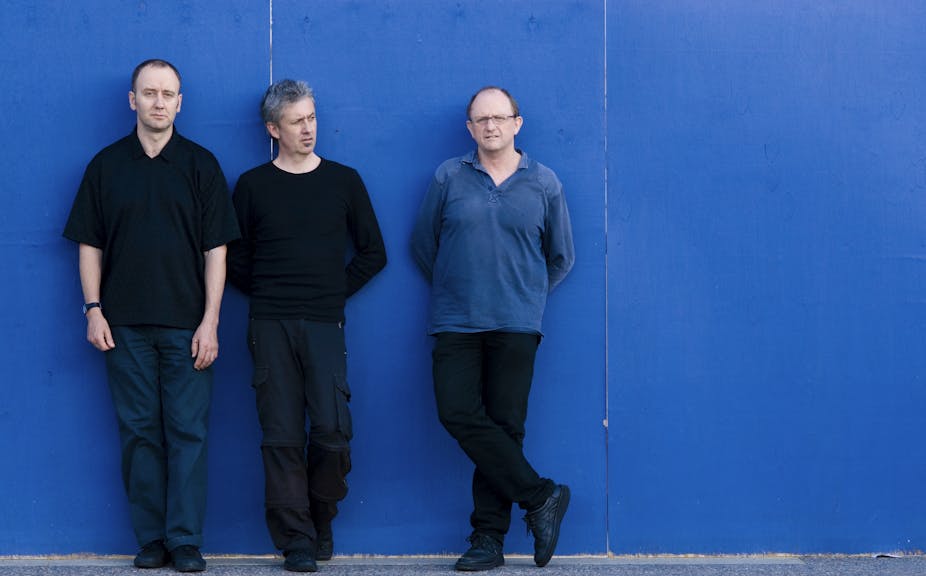Australian improvising trio The Necks – pianist Chris Abrahams, drummer Tony Buck and bass player Lloyd Swanton – recently released their 17th album, Open. Although the three began playing together in the late 1980s, their rise to relative international fame has been a long time coming.
Now, almost by stealth, the group has injected itself onto the edges of the canonical debate in music. The phrase “best band in the world” – following on from the only slightly less euphoric “one of the greatest bands in the world” epithet by the New York Times in 2007 – is being whispered by fans and critics alike. But could that title possibly apply to a band such as The Necks?
Musical outsiders
The Necks are very much musical outsiders. They release albums in an era of chaotic MP3 playlists; they fashion pieces of an hour or more when the average concentration span is measured in minutes. They also interact almost entirely by instinct in the face of an obsession with note-perfect reproductions of classical compositions and popular songs.
Moreover, while typically labelled “jazz,” the association is tenuous at best. Certainly, the US-based orthodoxy which unites around trumpet player Wynton Marsalis would want nothing to do with them.
In her 1967 essay The Aesthetics of Silence, Susan Sontag wrote: “the history of art is a sequence of successful transgressions.” The Necks have been offending (successfully) against tradition for the past quarter of a century. They do so mostly by occupying the spaces between accepted positions and obstinately refusing to obey genre rules.

In fact, the group’s career trajectory has in many ways mirrored its performance style. Most artists burst on to the scene before quickly flaming out, or loitering on in an endless decline. The Necks have accomplished a revolution by increments: they are to music what the slow food movement has been to cuisine.
Their sound combines sparkling surfaces with ominous undertows and it surges and recedes like the tidal currents. It is punctuated by thrilling silences – silences which may arise anywhere throughout their extended pieces, though the pauses that bookend each concert performance are especially significant.
Subtle variations in sound
In what seems a neat evocation of the group’s aesthetic, legendary (non)-musician Brian Eno once noted that “new ideas are nearly always slight shifts of things that are already very familiar to you.” Indeed, Eno’s own work is often taken as a point of comparison.

Nevertheless, music that tends to bring to mind that dictum usually bears little relationship to The Necks, other than the vague notion of innovation based upon subtle-yet-infinite variations on a theme. Examples might include the work of New York composer Steve Reich, North Indian classical music, avant-metal ensemble Sunn O))), or the “motorik” sound of German duo Neu!
In truth, the Necks have no real precedent, a circumstance that may in part be explained by the remarkably diverse backgrounds of each member. All three have engaged in a startling range of collaborations. Along the way, they have amassed a swag of baubles, including ARIAs for Necks albums Drive By (2003) and Chemist (2006), which have enhanced their local standing.
Suddenly, with Abrahams, Buck and Swanton having evolved from being a collective at the absolute margins of the culture into everyone’s favourite cult group, they are at risk of feeling the mainstream current lapping against their bows. So where does the band stand in relation to the unremitting (and unremittingly Anglo-American) debate around greatness in modern music?
As good as it gets?
Such talk tends to divide into two principal conservative camps: classical and rock. Perhaps the closest link The Necks have to the former is in the silence demanded of (or, better still, embraced by) audiences at their concerts. Otherwise, thankfully they look unlikely to don tuxedos for a live show any time soon.

As far as the rock narrative is concerned, it appears an even worse fit. Musicians who execute lengthy improvisations as subtle as a late period Rothko painting will always be avoided by those whose idea of a good night out is paying a small fortune to see The Eagles, or some other version of the walking dead, reanimate themselves by croaking through a repertoire that was already lacklustre 40 years ago.
Significantly, the major American rock music website Pitchfork reviewed a single Necks album a decade ago before apparently deciding they weren’t worth the trouble.
Ultimately, assertions of greatness made by fans or critics on behalf of The Necks would be ill-considered. Stylistically and generically, this unique band will always function on the fringes, drawing advocates to them rather than meeting tradition on its own securely fenced-off ground.
So rather than claim The Necks as the best band the world, it is preferable to contend that right now no-one anywhere is making better music. With Australia currently at risk of having its international reputation characterised by a scandalous attitude to human rights and inept environmental policies, The Necks are one cultural export well worth celebrating.

